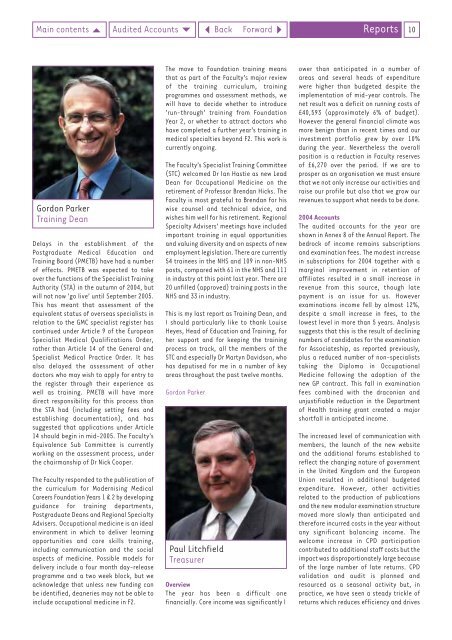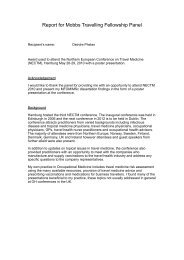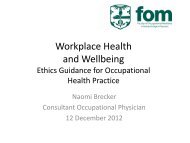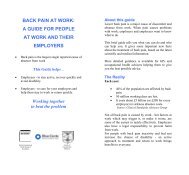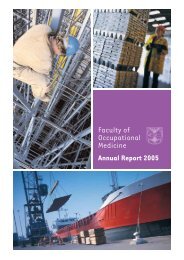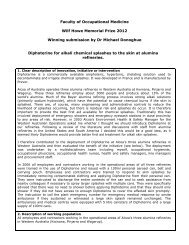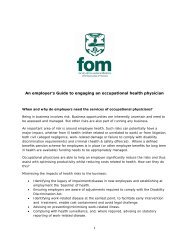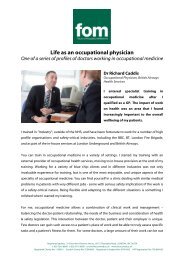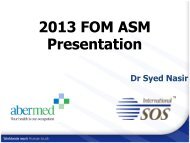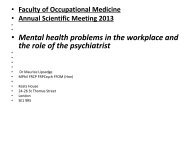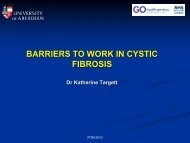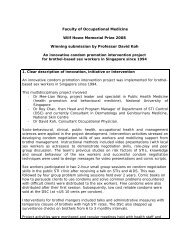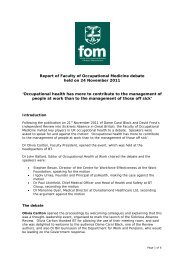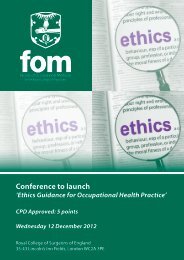FOM Annual Report 2004 - Faculty of Occupational Medicine
FOM Annual Report 2004 - Faculty of Occupational Medicine
FOM Annual Report 2004 - Faculty of Occupational Medicine
Create successful ePaper yourself
Turn your PDF publications into a flip-book with our unique Google optimized e-Paper software.
Main contents Audited Accounts Back Forward<br />
<strong>Report</strong>s<br />
10<br />
Gordon Parker<br />
Training Dean<br />
Delays in the establishment <strong>of</strong> the<br />
Postgraduate Medical Education and<br />
Training Board (PMETB) have had a number<br />
<strong>of</strong> effects. PMETB was expected to take<br />
over the functions <strong>of</strong> the Specialist Training<br />
Authority (STA) in the autumn <strong>of</strong> <strong>2004</strong>, but<br />
will not now ‘go live’ until September 2005.<br />
This has meant that assessment <strong>of</strong> the<br />
equivalent status <strong>of</strong> overseas specialists in<br />
relation to the GMC specialist register has<br />
continued under Article 9 <strong>of</strong> the European<br />
Specialist Medical Qualifications Order,<br />
rather than Article 14 <strong>of</strong> the General and<br />
Specialist Medical Practice Order. It has<br />
also delayed the assessment <strong>of</strong> other<br />
doctors who may wish to apply for entry to<br />
the register through their experience as<br />
well as training. PMETB will have more<br />
direct responsibility for this process than<br />
the STA had (including setting fees and<br />
establishing documentation), and has<br />
suggested that applications under Article<br />
14 should begin in mid-2005. The <strong>Faculty</strong>’s<br />
Equivalence Sub Committee is currently<br />
working on the assessment process, under<br />
the chairmanship <strong>of</strong> Dr Nick Cooper.<br />
The <strong>Faculty</strong> responded to the publication <strong>of</strong><br />
the curriculum for Modernising Medical<br />
Careers Foundation Years 1 & 2 by developing<br />
guidance for training departments,<br />
Postgraduate Deans and Regional Specialty<br />
Advisers. <strong>Occupational</strong> medicine is an ideal<br />
environment in which to deliver learning<br />
opportunities and core skills training,<br />
including communication and the social<br />
aspects <strong>of</strong> medicine. Possible models for<br />
delivery include a four month day-release<br />
programme and a two week block, but we<br />
acknowledge that unless new funding can<br />
be identified, deaneries may not be able to<br />
include occupational medicine in F2.<br />
The move to Foundation training means<br />
that as part <strong>of</strong> the <strong>Faculty</strong>’s major review<br />
<strong>of</strong> the training curriculum, training<br />
programmes and assessment methods, we<br />
will have to decide whether to introduce<br />
‘run-through’ training from Foundation<br />
Year 2, or whether to attract doctors who<br />
have completed a further year’s training in<br />
medical specialties beyond F2. This work is<br />
currently ongoing.<br />
The <strong>Faculty</strong>’s Specialist Training Committee<br />
(STC) welcomed Dr Ian Hastie as new Lead<br />
Dean for <strong>Occupational</strong> <strong>Medicine</strong> on the<br />
retirement <strong>of</strong> Pr<strong>of</strong>essor Brendan Hicks. The<br />
<strong>Faculty</strong> is most grateful to Brendan for his<br />
wise counsel and technical advice, and<br />
wishes him well for his retirement. Regional<br />
Specialty Advisers’ meetings have included<br />
important training in equal opportunities<br />
and valuing diversity and on aspects <strong>of</strong> new<br />
employment legislation. There are currently<br />
54 trainees in the NHS and 109 in non-NHS<br />
posts, compared with 61 in the NHS and 111<br />
in industry at this point last year. There are<br />
20 unfilled (approved) training posts in the<br />
NHS and 33 in industry.<br />
This is my last report as Training Dean, and<br />
I should particularly like to thank Louise<br />
Heyes, Head <strong>of</strong> Education and Training, for<br />
her support and for keeping the training<br />
process on track, all the members <strong>of</strong> the<br />
STC and especially Dr Martyn Davidson, who<br />
has deputised for me in a number <strong>of</strong> key<br />
areas throughout the past twelve months.<br />
Gordon Parker<br />
Paul Litchfield<br />
Treasurer<br />
Overview<br />
The year has been a difficult one<br />
financially. Core income was significantly l<br />
ower than anticipated in a number <strong>of</strong><br />
areas and several heads <strong>of</strong> expenditure<br />
were higher than budgeted despite the<br />
implementation <strong>of</strong> mid-year controls. The<br />
net result was a deficit on running costs <strong>of</strong><br />
£40,593 (approximately 6% <strong>of</strong> budget).<br />
However the general financial climate was<br />
more benign than in recent times and our<br />
investment portfolio grew by over 10%<br />
during the year. Nevertheless the overall<br />
position is a reduction in <strong>Faculty</strong> reserves<br />
<strong>of</strong> £6,270 over the period. If we are to<br />
prosper as an organisation we must ensure<br />
that we not only increase our activities and<br />
raise our pr<strong>of</strong>ile but also that we grow our<br />
revenues to support what needs to be done.<br />
<strong>2004</strong> Accounts<br />
The audited accounts for the year are<br />
shown in Annex 8 <strong>of</strong> the <strong>Annual</strong> <strong>Report</strong>. The<br />
bedrock <strong>of</strong> income remains subscriptions<br />
and examination fees. The modest increase<br />
in subscriptions for <strong>2004</strong> together with a<br />
marginal improvement in retention <strong>of</strong><br />
affiliates resulted in a small increase in<br />
revenue from this source, though late<br />
payment is an issue for us. However<br />
examinations income fell by almost 12%,<br />
despite a small increase in fees, to the<br />
lowest level in more than 5 years. Analysis<br />
suggests that this is the result <strong>of</strong> declining<br />
numbers <strong>of</strong> candidates for the examination<br />
for Associateship, as reported previously,<br />
plus a reduced number <strong>of</strong> non-specialists<br />
taking the Diploma in <strong>Occupational</strong><br />
<strong>Medicine</strong> following the adoption <strong>of</strong> the<br />
new GP contract. This fall in examination<br />
fees combined with the draconian and<br />
unjustifiable reduction in the Department<br />
<strong>of</strong> Health training grant created a major<br />
shortfall in anticipated income.<br />
The increased level <strong>of</strong> communication with<br />
members, the launch <strong>of</strong> the new website<br />
and the additional forums established to<br />
reflect the changing nature <strong>of</strong> government<br />
in the United Kingdom and the European<br />
Union resulted in additional budgeted<br />
expenditure. However, other activities<br />
related to the production <strong>of</strong> publications<br />
and the new modular examination structure<br />
moved more slowly than anticipated and<br />
therefore incurred costs in the year without<br />
any significant balancing income. The<br />
welcome increase in CPD participation<br />
contributed to additional staff costs but the<br />
impact was disproportionately large because<br />
<strong>of</strong> the large number <strong>of</strong> late returns. CPD<br />
validation and audit is planned and<br />
resourced as a seasonal activity but, in<br />
practice, we have seen a steady trickle <strong>of</strong><br />
returns which reduces efficiency and drives


